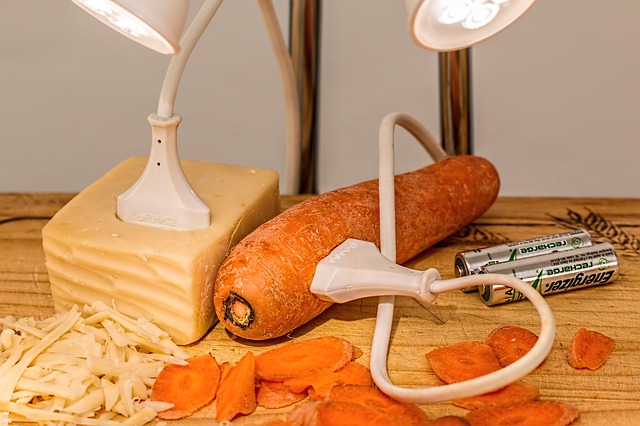
It’s natural to have a lot of questions about the world. As you wonder about these things and ask questions, you are learning. Curiosity about science helps you become an explorer finding out how things work and why things happen. Anyone can be a scientist, performing experiments to ask questions and get answers. You can even be a scientist at home, working on experiments with ingredients you probably have in your kitchen or laundry room. Always get a parent’s permission before you conduct experiments. Working as a team with an adult is best for safety.
If you’ve ever wondered why someone can measure and pour ingredients into a bowl, mix them up, and then bake the batter in the oven to make a cake, you’ve thought about science. The process of mixing certain ingredients together and adding heat causes the ingredients to react and change. For example, baking powder or baking soda in a cake recipe will react with acidic or wet things in the batter to puff it up and make the cake light and fluffy. Scientists tested these reactions so many times that they learned what would happen every time. This is called experimentation, and you can do it, too.
As you wonder and ask questions, experiments will let you watch chemical reactions as they happen. Even something as simple as writing a secret message on the bathroom mirror with a cotton swab and dish detergent can teach you about science. When the bathroom fills with warm steam from a shower, your message will appear like magic on the mirror. It’s not really magic, though. The dish detergent on the mirror is preventing water molecules in the steam from sticking together, so you can see the letters you wrote earlier.
The kitchen can be an ideal place for performing science experiments, with an adult’s help. For instance, with a few stalks of celery and some food coloring, you can watch capillary action happen almost before your eyes. Capillary action describes what happens as plants move water up from their roots to their leaves. Get four stalks of celery and cut off the bottoms so each stalk is 10 inches long. You’ll also need four identical cups, each filled with a half-cup of cool water. Decide what color you want to make the water, and then add the same number of drops of food coloring to each cup of water. Stir the water well with a spoon. Place one stalk of celery into each cup. After two hours, remove one stalk and label this one “two hours.” After four hours, remove another stalk and label it the same way. Do the same with the next stalk at six hours and the final stalk at eight hours. After you finish, compare the celery stalks to see how each one changed color, depending on how long it was in the colored water.
You could even step into the living room to have more scientific fun. Learn about static electricity with some tiny scraps of paper and a balloon. Blow up the balloon and tie it closed. Make a small pile of paper scraps on the floor, and rub the balloon back and forth several times on your hair or on a sweater. Immediately move the balloon to the paper and watch as the paper scraps cling to the balloon. Rub the balloon on your head or sweater again and then place it against the wall to see it stick there. This surprising sticking happens because you have moved electrons around and the balloon now has more of a negative charge, while the paper or the wall has more of a positive charge. Putting the two surfaces together makes the opposite charges stick to each other.
Have fun exploring science around your house and backyard. Take pictures of your experiment steps and make a science experiment notebook to record your findings. It’s safest to work with a parent or other adult when performing science experiments, though. Always get permission before you work like a scientist, and ask an adult to help you with the experiment steps.
Kitchen
- Finding the Speed of Light with Marshmallows: A Take-Home Lab
- Helping Your Child Learn Science
- Kitchen Science for Kids
- The Reality Kitchen: Instructions
- Cabbage Juice Indicator
- Testing for Glucose and Starch
Bathroom
- Shaking for Suds: Which Type of Water is the Hardest?
- Six Weird Science Experiments
- Soap Souffle
- Physics in the Bathroom: Ripping Neatly
Living Room
- Physics Experiments That You Can Do at Home
- Measuring Reflexes
- String it Along
- Remote Control Roller
- A Pin-Hole Camera
Laundry Room
- Tie-Dyed Milk
- Flubber Recipe
- The Iodine Clock Reaction
- Fun with Phosphors
- Green Chemistry Interactive Displays
Backyard
- Measuring the Speed of Sound Using Echoes
- Backyard Weather Station
- Do You Know What Soil is Made of?
- Beyond the Fizz
- Science in the Backyard
Additional Information
- 40 Cool Science Experiments on the Web
- On a Roll
- Physical Science Teachers’ Guide
- Kindergarten to Grade 4 Science
- Science: States of Matter


Are You Familiar With This Topic? Share Your Experience.